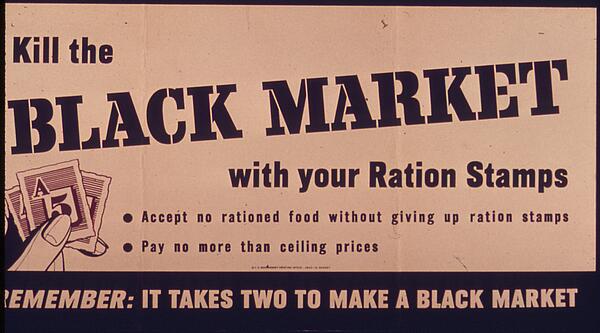The Black Market
The black market was the trade in goods that violated the rationing regulations during World War Two. Labelled “treason of the very worst kind” by the Labour Party MP Joseph Clynes, the government passed legislation which enables courts to fine those participating in the black market £500. However, the black market continued being one of the few ways in which people could hold of rationed goods, including cigarettes, makeup and petrol.
The german U-boats in the Atlantic greatly restricted trade, which resulted in rationing - measures put in place by the government to ensure that everybody would have enough to eat. The Black Market emerged to fill the demand for rationed goods.
Some goods were in short supply even though they were not rationed, such as cigarettes and alcohol. Both these commodities could be found on the black market. Penalties were severe for those caught dealing on the Black Market, including a fine of up to £500 and a two-year prison term. On top of the fine, offenders also had to pay a penalty of three times the value of the goods they had sold. The government also appointed 900 inspectors to weed out black marketeers. However, these punishments did not halt the growth of the black market. For one, customers were more likely to keep quiet, as they relied on those working on the black market to provide them with restricted goods.

The black marketeers became known as ‘spivs’, which is still slang for ‘petty criminal’. Spivs were portrayed in many post-war films and sit-coms as loveable rogues with the interests of the British public at heart. However, in reality these traders had a lot at stake - if caught they would face serious punishment.
The Black Market also encouraged professional criminals to find ways of profitting during wartime. During the blitz, one standard ruse for thieves was to kit themselves out with an ARP (Air Raid Precautions) warden's helmet and armband and smash their way into shops when no one was looking. Such was the power of the armband that the public would dutifully help load up a car, believing that the goods were being removed for safekeeping. Some unscrupulous villains even used vehicles disguised as ambulances for their getaways.
However, farmers provided the main the source of Black Market goods as they knew that selling off some of their produce to the black market would result in larger profits than selling it all to the government. The blackout also helped people working on the Black Market as the darkness made it easier to trade illicit goods.
See also: Home Guard
MLA Citation/Reference
"The Black Market". HistoryLearning.com. 2026. Web.
